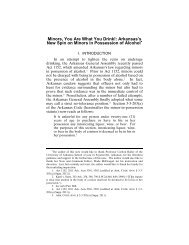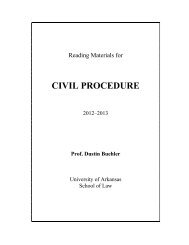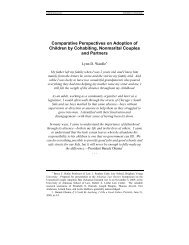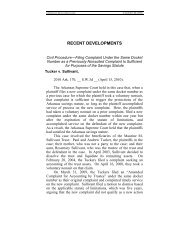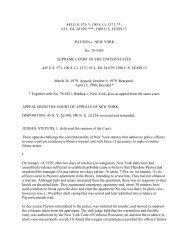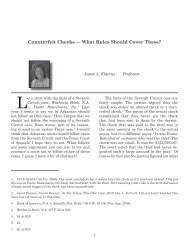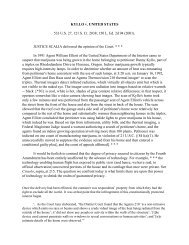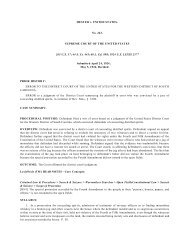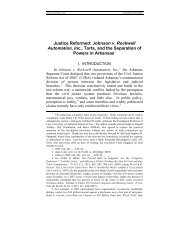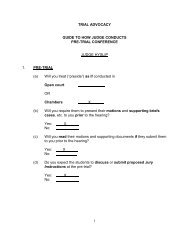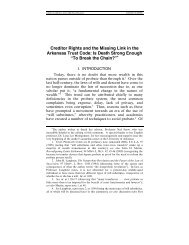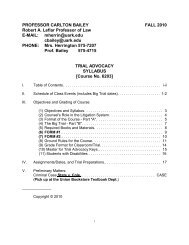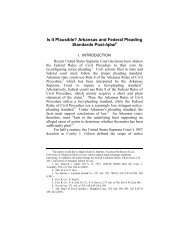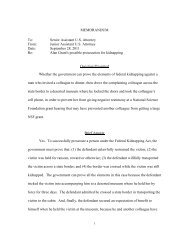Facebook Discovery and the Unbearable Sameness of Internet Law
Facebook Discovery and the Unbearable Sameness of Internet Law
Facebook Discovery and the Unbearable Sameness of Internet Law
Create successful ePaper yourself
Turn your PDF publications into a flip-book with our unique Google optimized e-Paper software.
56 ARKANSAS LAW REVIEW [Vol. 65:39<br />
o<strong>the</strong>r social-networking sites make no promise to keep one’s<br />
posts, comments, <strong>and</strong> o<strong>the</strong>r materials confidential. 67<br />
But that does not mean <strong>the</strong>re are not any privacy interests at<br />
stake at all. It is hardly <strong>the</strong> case that sharing information with a<br />
limited number <strong>of</strong> people removes all privacy interests from that<br />
information. 68 Ra<strong>the</strong>r, it can only be said that <strong>the</strong> privacy<br />
interests in social-networking site discussions are not so extreme<br />
as to bar any production <strong>of</strong> material, no matter how relevant,<br />
from a social-networking account. The burden on <strong>the</strong> plaintiff,<br />
however, including <strong>the</strong> burden on <strong>the</strong> plaintiff’s privacy <strong>and</strong><br />
social relationships, must still be balanced against <strong>the</strong> need for<br />
<strong>the</strong> discovery even if <strong>the</strong> requested information is relevant.<br />
Under Rule 26(b)(2), “<strong>the</strong> court must limit <strong>the</strong> frequency or<br />
extent <strong>of</strong> discovery o<strong>the</strong>rwise allowed by <strong>the</strong>se rules . . . if it<br />
determines that . . . <strong>the</strong> burden or expense <strong>of</strong> <strong>the</strong> proposed<br />
discovery outweighs its likely benefit . . . .” 69 Protecting a party<br />
from “annoyance, embarrassment, [or] oppression” is expressly<br />
contemplated under <strong>the</strong> Rules. 70 If <strong>the</strong> importance <strong>of</strong> <strong>the</strong><br />
sought-after information is slim, <strong>and</strong> <strong>the</strong> intrusiveness is great,<br />
courts have <strong>the</strong> discretion to limit discovery <strong>of</strong> such materials or<br />
even order that it not be had. 71<br />
Finally, courts ordering access to an account have required<br />
<strong>the</strong> requesting party to first demonstrate a likelihood that<br />
20 (Can. Ont. Super. Ct. J.) (WL) (“The plaintiff could not have a serious expectation <strong>of</strong><br />
privacy given that 366 people have been granted access to <strong>the</strong> private site.”).<br />
67. See Romano, 907 N.Y.S. 2d at 656-57; McMillen, 2010 WL 4403285.<br />
68. See United States v. Jones, 132 S. Ct. 945, 957 (2012) (Sotomayor, J.,<br />
concurring) (“I would not assume that all information voluntarily disclosed to some<br />
member <strong>of</strong> <strong>the</strong> public for a limited purpose is, for that reason alone, disentitled to Fourth<br />
Amendment protection.”); Multimedia WMAZ, Inc. v. Kubach, 443 S.E.2d 491, 494 (Ga.<br />
Ct. App. 1994) (disclosure <strong>of</strong> HIV-positive status to small group <strong>of</strong> family <strong>and</strong> friends did<br />
not make fact public); DANIEL J. SOLOVE, THE DIGITAL PERSON: TECHNOLOGY AND<br />
PRIVACY IN THE INFORMATION AGE 43-44 (2004) (“[T]he underst<strong>and</strong>ing <strong>of</strong> privacy as<br />
secrecy fails to recognize that individuals want to keep things private from some people but<br />
not o<strong>the</strong>rs.”); Lior Jacob Strahilevitz, A Social Networks Theory <strong>of</strong> Privacy, 72 U. CHI. L.<br />
REV. 919, 974-75 (2005) (defining reasonable expectation <strong>of</strong> privacy in terms <strong>of</strong> risk that a<br />
certain piece <strong>of</strong> information will flow outside a given social network).<br />
69. FED. R. CIV. P. 26(b)(2)(C). The court is to consider five factors in making such<br />
a determination: “<strong>the</strong> needs <strong>of</strong> <strong>the</strong> case, <strong>the</strong> amount in controversy, <strong>the</strong> parties’ resources,<br />
<strong>the</strong> importance <strong>of</strong> <strong>the</strong> issues at stake in <strong>the</strong> action, <strong>and</strong> <strong>the</strong> importance <strong>of</strong> <strong>the</strong> discovery in<br />
resolving <strong>the</strong> issues.” FED. R. CIV. P. 26(b)(2)(C)(iii).<br />
70. FED. R. CIV. P. 26(c)(1).<br />
71. See, e.g., Gonzales v. Google, Inc., 234 F.R.D. 674, 687-88 (N.D. Cal. 2006)<br />
(considering burden on users’ privacy in granting requested discovery).



